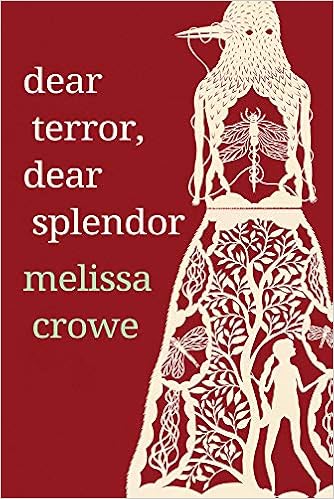 Reviewed by Charles Rammelkamp
Reviewed by Charles Rammelkamp
Dear Terror, Dear Splendor
by Melissa Crowe
The University of Wisconsin Press
Feb 2019, $14.95, 104 pages, ISBN: 978-0-299-32144-4
The great theme of Melissa Crowe’s Dear Terror, Dear Splendor is time and the changes that inescapably come with time. In its service she shines a light on various stages of her own life, from her youth in Maine, to marriage, pregnancy and beyond. We see this particularly in the poems she writes about her daughter (“whenever I kiss this little girl, I’m kissing her goodbye,” she writes in “”The War, the War, Christmas”). The poem that opens the collection, like a prelude or a prologue, is entitled “The River.” What better metaphor for time? “There are uncles at the bottom / of the river,” the poem begins, and we understand how time accumulates and nothing really remains the same; yet no matter how fleeting the stream we “sink
to the bottom of memory where
we look up through the water and see
the dizzy light of stars as dead
as uncles and a blur of birds
that seem unsinkable in flight.
Notably, the first poems in the collection focus on the end of life – a grandfather with dementia, an uncle wrecked in a car accident, a mother dying from cancer (She “lay on the couch, her tail of rubber / tubed into a plastic sack of urine / on the floor.”), during the narrator’s childhood years, before moving on to marriage and the rest of life. These events leave an indelible mark. “Mourning Portrait for Uncle Steve” tells the story of a man her aunt falls for, in prison “for shooting a man without meaning / to kill him.” He’s actually a kind, fair man, whom they all love and look forward to a life that includes him “before a Mack truck / crushed everything we thought would happen / when you got out.”
Given these early impressions of the fragility of life, the tenuousness of time, it’s no wonder there’s so much taking-nothing-for-granted throughout the meditations on marriage, motherhood and family that make up this collection. “Elegy for Fireflies,” a poem directed toward her daughter, is a particularly moving poem about being pregnant and fearing a miscarriage. When, during a routine checkup at the hospital, the Doppler doesn’t seem to detect any signs of life in her womb, the narrator and her husband fear the worst has happened.
In that moment, we were childless, too,
you just a story we’d told on the playground.We’d have to give up our fond wish,
the hope that if we said a thing enoughit could be true. When the midwife came back
wheeling the machine, we felt sure she’d find
nothing, but you appeared, bug in a jar.
There you were, buzzing with blood. There you were,but what had been born already was your loss,
and we’d go nowhere without it anymore.
This intricate mixture of joy and grief, celebration and fear, is expressed over and over again in these poems. In “Damage,” a poem about her young daughter mistaking the words damn it for damage, the poet reflects, hearing her daughter’s mistake when she stubs her toe or startles when a door slams, “damage [is] the right word:
for what the world does,
throbbing us with hungeror defeat. Even love is damage
or its aftermath….
“Love Song for Vehophobia” – fear of driving – which recalls the deaths and injuries she’s witnessed in her life (“my uncle’s pelvis / puzzled pieces”), provokes a protective reaction regarding her daughter. “…apart from / home, where is there to go that’s worth the risk?” The title poem, written on the occasion of her daughter starting to drive (“Dear Terror, Dear Splendor, Annabelle / got her learner’s permit today.”) likewise pushes these fear/protection buttons.
Remember when that chicken, pecking for food, bit her finger
and I spent months fearing tetanus? Remember when a bat
bloomed into the house through a hole in the window screenand my brain throbbed rabies for a year or when she cut
her foot, hit her head, coughed
black blood, was bornwith a fever
a softspot
a self?
Yes, Crowe is gently mocking herself here, exaggerating her reaction, but the mixture of emotion is plain to see. The complexity is likewise evident in “Apologia with Generalized Anxiety Disorder,” plain from the very title. So is her nimbleness with language.
There are poems in Dear Terror, Dear Splendor about the difficulties of a sister coming out as a lesbian (“Skydiver”), a brother addicted to opioids and deployed to Afghanistan (“Still Life with Geese and Oxycontin” and “The War, the War, Christmas”), but there are other kinds of poems, as well. “Epithalamium with Acrobats” is a more lighthearted celebration of her marriage, in which she writes these joyful lines with the same impressive dexterity with words, if with the same lurking fear:
Ah love, let us be clowns to one another
our mouths drawn down, yes, but
every frown and tear merely
grease paint….
The final poem, “Some Say the World” (from Robert Frost’s “Fire and Ice”) is addressed to her daughter, Annabelle, on her 18th birthday. Yes, time again. It just doesn’t stop! The poem takes place during the Women’s March in 2017, shortly after President Trump’s inauguration. Crowe is there with her daughter, weeping loudly. “My mother feels things
deeply, you explain to the tall woman
in the pussy hat….
About the reviewer: Charles Rammelkamp is Prose Editor for BrickHouse Books in Baltimore and Reviews Editor for The Adirondack Review. A chapbook of poems, Jack Tar’s Lady Parts, is available from Main Street Rag Publishing. Another poetry chapbook, Me and Sal Paradise, was recently published by FutureCycle Press. An e-chapbook has also recently been published online Time Is on My Side (yes it is). Another chapbook, Mortal Coil, is forthcoming from Clare Songbirds Publishing.